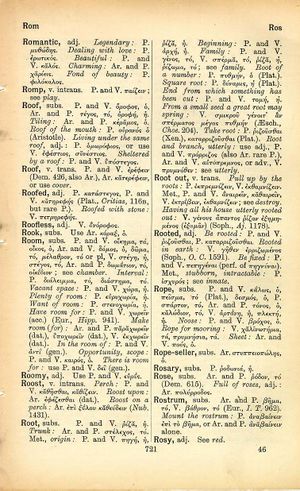root out
Ὥσπερ αὐτοῦ τοῦ ἡλίου μὴ ὄντος καυστικοῦ, ἀλλ' οὔσης ζωτικῆς καὶ ζωοποιοῦ θέρμης ἐν αὐτῷ καὶ ἀπλήκτου, ὁ ἀὴρ παθητικῶς δέχεται τὸ ἀπ' αὐτοῦ ϕῶς καὶ καυστικῶς· οὕτως οὖν ἁρμονίας οὔσης ἐν αὐτοῖς τινὸς καὶ ἑτέρου εἴδους ϕωνῆς ἡμεῖς παθητικῶς ἀκούομεν → Just as although the Sun itself does not cause burning but has a heat in it that is life-giving, life-engendering, and mild, the air receives light from it by being affected and burned, so also although there is a certain harmony and a different kind of voice in them, we hear it by being affected.
English > Greek (Woodhouse)
verb transitive
pull up by the roots: P. ἐκπρεμνίζειν, V. ἐκθαμνίζειν.
Met., P. and V. ἀναιρέω, ἀναιρεῖν, καθαιρεῖν, V. ἐκτρίβειν, ἐκθαμνίζειν; see destroy.
having all his house utterly rooted out: V. γένους ἅπαντος ῥίζαν ἐξημημένος (ἐξαμᾶν) (Soph., Ajax 1178).

